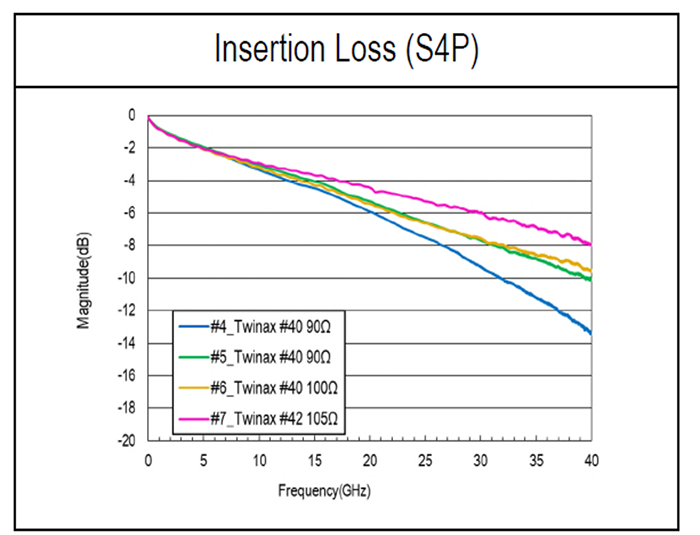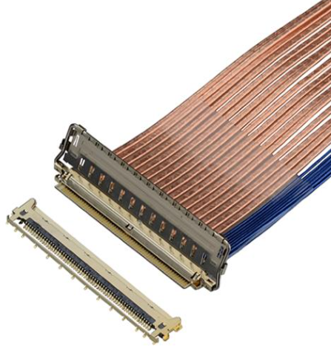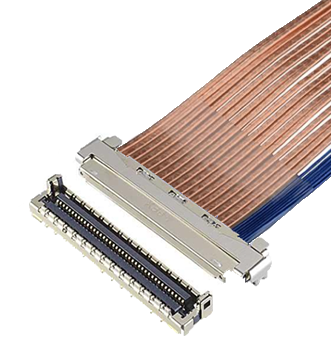Twinaxialケーブルハーネスとは? | 細線同軸・Twinaxialコネクタ
Twinaxialケーブルは、通常、差動信号に使用される2本の中心導体での構成となってます。2本の導体は分離され、ゴムやプラスチックのような絶縁体で囲まれています。細線同軸ケーブルのように、絶縁のためにこれらの導体の周りに誘電体の外層、グランドリターン電流用の金属製外部導体シールドと外部ジャケットがあります。Twinaxialケーブルは、低電圧、低スキュー、厳密な位相整合信号を使用する高速デジタルデータ伝送に適しています。また、これらのケーブルは、PCBトレースよりも熱放散が少なく、信号損失が少ないため、基板上のデバイスの相互接続に使用できます。システムで要求されるシグナルインテグリティ性能に基づき、I-PEXコネクタで使用するさまざまなサイズのTwinaxialケーブルを用意しています。

Wire O.D. (Width)
AWG (size) |
Characteristic impedance (ohm) |
C.C.O.D : Center Conductor Outer Diameter |
Wire .O.D.
|
Color |
Rating Temperature (℃) |
#40 |
90 |
0.09 |
0.38×0.59 |
Blue |
80 |
100 |
0.09 |
0.41×0.62 |
Blue |
80 |
|
#42 |
105 |
0.075 |
0.35×0.54 |
Blue |
80 |

(dB) |
10 GHz |
20 GHz |
30 GHz |
40 GHz |
*内部導体素材 |
|
#4 |
Twinaxial cable AWG#40 90ohm |
-3.34 |
-5.92 |
-9.29 |
-13.42 |
Sn Plated Sn-Cu Alloy |
#5 |
Twinaxial cable AWG #40 90ohm |
-3.05 |
-5.28 |
-7.68 |
-10.09 |
Tinned copper alloy |
#6 |
Twinaxial cable AWG #40 100ohm |
-3.18 |
-5.44 |
-7.58 |
-9.62 |
Tinned copper alloy |
#7 |
Twinaxial cable AWG #42 105ohm |
-2.94 |
-4.44 |
-5.98 |
-7.94 |
Silvered copper alloy |
AWG#42ケーブルはAWG40ケーブルより損失が少ないですが、これは内部導体メッキの効果によるものと考えられます。
Twinaxialケーブルアッセンブリには、オプションのメカニカルロック付きシールドコネクタと非シールドコネクタの両方を準備しています。比較的離れた場所に部品が配置された設計で、PCBトレース上を移動する低速信号は、信号間の干渉が少ないため、EMIシールドなしのコネクタを使用することができます。しかし、比較的小型でコンパクトな設計の高周波信号には、信頼性の高い接続のためにZenShield®とオプションのメカニカルロック機能を備えた完全シールドコネクターを推奨します。
AWG 40および42サイズのTwinaxialケーブルは、CABLINE®-VS、CABLINE®-VS II、CABLINE®-CA、CABLINE®-CA IIおよびCA II PLUS、CABLINE®-UMシリーズ製品に使用することができ、使用するケーブルの物理的サイズや損失プロファイルが異なる場合でも、電気的および機械的な設計の柔軟性を提供する完全なハーネスソリューションを提供します。
ZenShield®は、Twinaxia;ケーブル用のCABLINE®-VS II、CABLINE®-CA II、CABLINE®-CA II PLUSで提供される完全な360度金属シールドです。ZenShield®を使用することで、EMIやスイッチングノイズを最小限に抑え、高密度で混雑したPCBレイアウトでも完全なハーネスを実現できます。同様に、CABLINE®-VS/ VS II、CABLINE®-CA、およびCABLINE®-CA II/ CA II PLUSシリーズ製品にもメカニカルロック機能が搭載されており、振動や可動部の多いアプリケーションでの信頼性と堅牢性が向上します。

|

|
